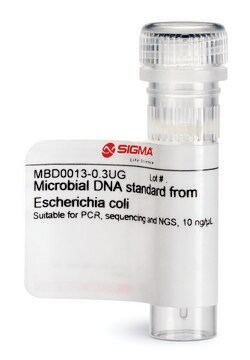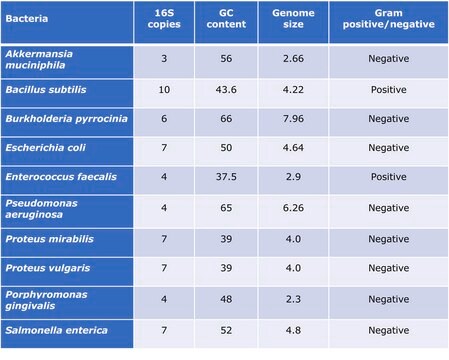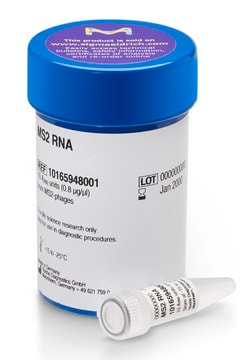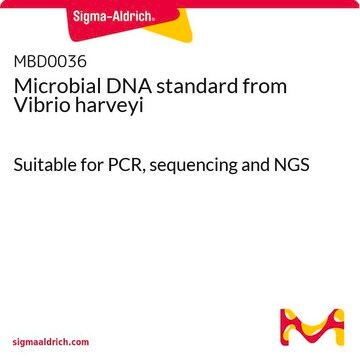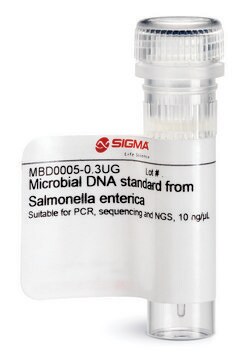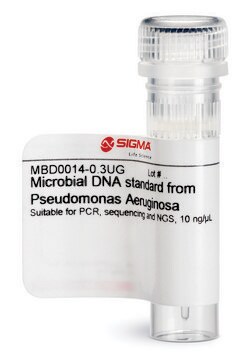MBD0038
Fungal DNA standard from Aspergillus fumigatus
Suitable for PCR, sequencing and NGS
Autenticatiper visualizzare i prezzi riservati alla tua organizzazione & contrattuali
About This Item
Codice UNSPSC:
41105500
NACRES:
NA.24
Prodotti consigliati
Livello qualitativo
Forma fisica
liquid
Concentrazione
10 ng/μL
tecniche
FISH: suitable
Condizioni di spedizione
ambient
Temperatura di conservazione
−20°C
Descrizione generale
Standardization of sample analysis is essential in microbiome genomics research workflow. Lack of standardization can lead to biases and errors in common processes during sample preparation and analysis such as sample amplification, sequencing, and bioinformatics analyses.1 The human microbiome includes not only bacteria, but also viruses and fungi. While the “bacteriome” field has been researched extensively in the past years, fungi, comprising the “mycobiome”, remain relatively neglected. Fungi and yeasts have been shown to be involved in illness conditions such as cancer and gastrointestinal disease. The human gut is populated by three fungal phyla, Ascomycota, Basidiomycota, and Zygomycota.
The fungal microbial genomic DNA standard from Aspergillus fumigatus can serve as standard for benchmarking the performance along the workflow of microbiome research and metagenomic analyses, as well as a tool to increase reproducibility and allow comparison of results obtained by different labs.
Aspergillus fumigatus is an ubiquitous saprotroph fungus belonging to Ascomycota. Aspergillus fumigatus spores can induce allergic airways response after antibiotic treatment2. With increases in the number of immunosuppressed patients, there has been a dramatic increase in severe and usually fatal invasive aspergillosis, caused by the conidia of Aspergillus species. Aspergillosis is now the most common mold infection worldwide.3
The genomic DNA is provided at ≥10 ng/μL concentration in TE buffer pH 8.0. It is recommended to avoid freeze thaw cycles with this product.
Read here how to use our standards to ensure data integrity for your microbiome research.
The fungal microbial genomic DNA standard from Aspergillus fumigatus can serve as standard for benchmarking the performance along the workflow of microbiome research and metagenomic analyses, as well as a tool to increase reproducibility and allow comparison of results obtained by different labs.
Aspergillus fumigatus is an ubiquitous saprotroph fungus belonging to Ascomycota. Aspergillus fumigatus spores can induce allergic airways response after antibiotic treatment2. With increases in the number of immunosuppressed patients, there has been a dramatic increase in severe and usually fatal invasive aspergillosis, caused by the conidia of Aspergillus species. Aspergillosis is now the most common mold infection worldwide.3
The genomic DNA is provided at ≥10 ng/μL concentration in TE buffer pH 8.0. It is recommended to avoid freeze thaw cycles with this product.
Read here how to use our standards to ensure data integrity for your microbiome research.
Applicazioni
Suitable as a standard for PCR, Sanger and next generation sequencing (NGS).
Caratteristiche e vantaggi
- Individual microbial standard for microbiomics and meta-genomics workflow
- Suitable standard for PCR, Sanger sequencing and 18S NGS
- Improves bioinformatics analyses
- Increases reproducibility and repeatability
- Identity and purity of the genomic Aspergillus fumigatus DNA has been confirmed by 18S NGS and gel electrophoresis
Stato fisico
Liquid -The genomic DNA is provided at ≥10 ng/μl concentration in TE buffer pH 8.0
Codice della classe di stoccaggio
12 - Non Combustible Liquids
Classe di pericolosità dell'acqua (WGK)
WGK 1
Certificati d'analisi (COA)
Cerca il Certificati d'analisi (COA) digitando il numero di lotto/batch corrispondente. I numeri di lotto o di batch sono stampati sull'etichetta dei prodotti dopo la parola ‘Lotto’ o ‘Batch’.
Possiedi già questo prodotto?
I documenti relativi ai prodotti acquistati recentemente sono disponibili nell’Archivio dei documenti.
Il team dei nostri ricercatori vanta grande esperienza in tutte le aree della ricerca quali Life Science, scienza dei materiali, sintesi chimica, cromatografia, discipline analitiche, ecc..
Contatta l'Assistenza Tecnica.